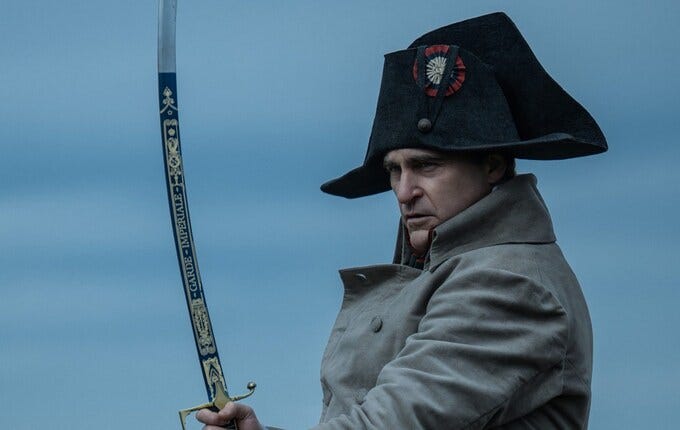When I saw Napoleon, the theatre was packed and everyone was dead quiet except for the crackling of candy wrappers and the random buzzing of seat recliners. The French Revolution is in full swing, Napoleon is rising in the ranks of the military and in his personal life, and it all looks very impressive. It moves along at a nice clip. Joaquin Phoenix is quite the competent actor to say the least and no stranger to playing neurotic rulers.
Something didn’t sit right with me, though, and I couldn’t figure it out. It wasn’t until Josephine, scene-stealingly played by Vanessa Kirby, suggestively hitched up her dress and spread her legs a la Catherine Tramell that I finally realized what the problem was: I was not looking at Napoleon Bonaparte. I was looking at Napoleon, the mildly menacing dude who whispers ominously and throws stuff when he gets mad. Where was Napoleon’s bravado? His showmanship? His overly inflated ego? I might as well have been looking at Napoleon Dynamite, talking big but ultimately having to learn to be himself.
This Napoleon’s interactions with his wife, because we all know Josephine and Napoleon marry, are decidedly unromantic and downright mystifying. Each time they go the way of all flesh, Josephine’s face always asks when things are going to get good.
As plenty of reviewers have pointed out, there are a lot of moments in the film that are unintentionally funny, such as when Napoleon tells a bunch of Englishmen, “You think you’re so great because you have boats!” or just plain creepy, such as when Josephine tells Napoleon that he’s nothing without her even though they both cheat and barely seem to like each other.
Oh yes, Napoleon and Josephine’s relationship is pretty colorful and they don’t care who knows it. One night in the middle of a bickering match Napoleon declares, “Destiny has brought me to this lamb chop!” even though it’s not a lamb chop he’s eating, as Phoenix is famously vegan. Then he and Josephine lob some victuals at each other before she storms off in anger, leaving their dinner guests silently agog.
It’s not the last time Napoleon throws food, either. While in exile on St. Helena at the end of his life, he throws grapes at two little girls who dare correct him on his military record. Then the camera focuses on his back right before he keels over stage left and a line of text says Napoleon died after six years on St. Helena.
“Oh yeah, he’s supposed to be older now,” I thought as the movie lists Napoleon’s more-or-less official wartime body count before the ending credits, during which the audience either sat in stunned silence or made for the exit. Literally no one was smiling. I heard snatches of conversation on my way out, most of them variations of, “What in Hades did we just watch?”
What in Hades, indeed. I wish the movie had been all about Napoleon’s battle record or Napoleon and Josephine instead of both, because we don’t get time to sit in either place, not to mention it all feels choppy and skims the surface of a turbulent era. We certainly don’t see anything of what made Napoleon a formidable leader and military strategist. There’s a director’s cut coming to AppleTV later that should connect the dots more, but I’m not sure how much more of this movie I can take.
I wish Napoleon showed us Napoleon and Josephine as they really were. We know that they were very passionate about each other and regretted their divorce very much, after which Josephine retreated from public life and spent time at her house gardening and having friends over. Their real story doesn’t need embellishment, but that’s not the story we get in Napoleon. What a shame.
Napoleon is currently in theaters. Rated R.
My grade: C+
Principal Cast: Joaquin Phoenix, Vanessa Kirby, Tahar Rahim, Rupert Everett, Mark Bonnar, Paul Rhys, Ben Miles, Riana Duce, Ludivine Sagnier, Edouard Philipponnat, Miles Jupp, Scott Handy, Youssef Kerkour, John Hollingworth, Abubakar Salim, Thom Ashley, Jannis Niewohner, Julian Rhind-Tutt.
Directed by Ridley Scott.
Written by David Scarpa.




